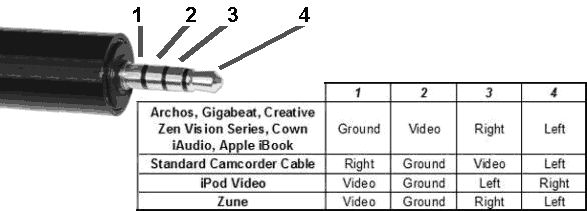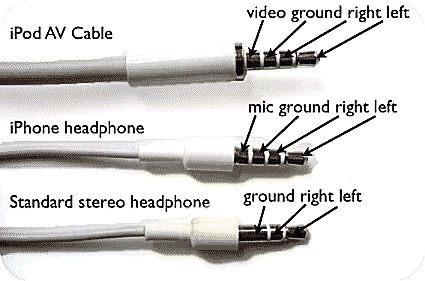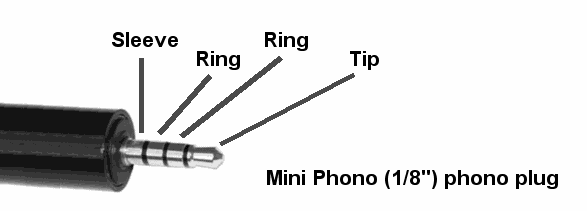TRRS Phono Plug: Difference between revisions
No edit summary |
No edit summary |
||
| (3 intermediate revisions by the same user not shown) | |||
| Line 1: | Line 1: | ||
This audio jack is similar to the TRS Phono Plug, with the exception that there is an additional ring, resulting in a Tip + Ring + Ring + Sleeve configuration. The TRRS phono plug facilitates the addition of another connection since there are 4 contact places on the jack separated by three insulation layers. The two most common applications today for the TRRS phono plug in Mini Phono is for video camera recorders and mobile audio devices including the iPod, iPhone, and Android phones. | This audio jack is similar to the [[TRS Phono Plug]], with the exception that there is an additional ring, resulting in a Tip + Ring + Ring + Sleeve configuration. The TRRS phono plug facilitates the addition of another connection since there are 4 contact places on the jack separated by three insulation layers. The two most common applications today for the TRRS phono plug in Mini Phono is for video camera recorders and mobile audio devices including the iPod, iPhone, and Android phones. | ||
A TRRS plug or Tip Ring Ring Sleeve plug has four contacts, which are sometimes referred to as poles. So a TRRS is a three ring four pole connector. TS = 3 Ring and 4 Pole | A TRRS plug or Tip Ring Ring Sleeve plug has four contacts, which are sometimes referred to as poles. So a TRRS is a three ring four pole connector. TS = 3 Ring and 4 Pole | ||
| Line 29: | Line 29: | ||
|} | |} | ||
[[File:trrs-motoroladroid.png]]<BR>Some Android smartphones use use the original Nokia convention. Early Motorola Droid phones use the Nokia convention. It is unknown if the newest Motorola Droids use the same. | |||
Standard TRS audio plugs should work fine in these devices for audio playback from the Android phone to a stereo receiver. Shorting the microphone and ground doesn't seem to harm the device for most phones with the Nokia TRRS jack. | |||
Along came Apple Computer Company with their iPod and iPhone audio devices. Rather than accepting an existing convention, Apple created chaos for device manufacturers by swapping the microphone and ground connections. Think different? | |||
{| border="1" class="wikitable" | {| border="1" class="wikitable" | ||
| Line 46: | Line 50: | ||
| Microphone | | Microphone | ||
|} | |} | ||
By preserving the left and right audio convention it allows the use of standard TRS headphones on apple devices. Although connecting TRS headphones does short the ground and microphone connection, it reportedly does no harm and full stereo audio is available in the headphones. | By preserving the left and right audio convention it allows the use of standard TRS headphones on apple devices. Although connecting TRS headphones does short the ground and microphone connection, it reportedly does no harm and full stereo audio is available in the headphones. | ||
| Line 127: | Line 129: | ||
[[Category:PDA]] | [[Category:PDA]] | ||
[[Category:Android]] | [[Category:Android]] | ||
[[Category:Mobile Phones]] | |||
Keywords: Android Phone Apple iPod iPhone handsfree bluetooth headphones headset | Keywords: Android Phone Apple iPod iPhone handsfree bluetooth headphones headset | ||
Latest revision as of 11:49, 27 February 2013
This audio jack is similar to the TRS Phono Plug, with the exception that there is an additional ring, resulting in a Tip + Ring + Ring + Sleeve configuration. The TRRS phono plug facilitates the addition of another connection since there are 4 contact places on the jack separated by three insulation layers. The two most common applications today for the TRRS phono plug in Mini Phono is for video camera recorders and mobile audio devices including the iPod, iPhone, and Android phones.
A TRRS plug or Tip Ring Ring Sleeve plug has four contacts, which are sometimes referred to as poles. So a TRRS is a three ring four pole connector. TS = 3 Ring and 4 Pole
Polarity
Audio Devices
The most common audio device application for the TRRS connector is the microphone + headphone headset. The stereo headphones include a microphone for use with modern mobile phones, such as the Motorola Droid. These hands free headsets utilize the additional contact on the jack for the microphone, and share a common ground.
Unfortunately, there are competing conventions for the contact assignment of these TRRS phono plugs. The original convention has been established for decades and was adopted by Nokia for their mobile phones for hands free headsets. For the purposes of identification it will be referred to as the Nokia convention.
| Tip | Left Audio |
| Ring | Right Audio |
| Ring | Microphone |
| Sleeve | Ground |

Some Android smartphones use use the original Nokia convention. Early Motorola Droid phones use the Nokia convention. It is unknown if the newest Motorola Droids use the same.
Standard TRS audio plugs should work fine in these devices for audio playback from the Android phone to a stereo receiver. Shorting the microphone and ground doesn't seem to harm the device for most phones with the Nokia TRRS jack.
Along came Apple Computer Company with their iPod and iPhone audio devices. Rather than accepting an existing convention, Apple created chaos for device manufacturers by swapping the microphone and ground connections. Think different?
| Tip | Left Audio |
| Ring | Right Audio |
| Ring | Ground |
| Sleeve | Microphone |
By preserving the left and right audio convention it allows the use of standard TRS headphones on apple devices. Although connecting TRS headphones does short the ground and microphone connection, it reportedly does no harm and full stereo audio is available in the headphones.
Older cellular phones utilizing a TRRS jack utilized the Nokia convention, and were Sub-Mini Thirty-Second (3/32) sized jacks. Then the Sub-Mini was phased out in favor of the more common Mini Phono (1/8) jack. Android, Blackberry, and iPhone all currently utilize the Mini Phono size, although the wiring configuration has two competing conventions.
There are an array of adapters available to resolve the various incompatibilities in plug and jack size, as well as competing wiring conventions. Another issue created by Apple (typically the culprit) is the depth of the jack on the device. Originally the Apple iPhone had a jack that was recessed unusually deep in the device, so that regular TRRS or TRS jacks wouldn't fit all the way in. An adapter is available which allows you to fit a regular headset into the recessed area. There's adapters to allow a male Mini Phono to plug into a Sub-Mini jack. There's even an adapter to swap the last ring and sleeve connection around to iPod headsets will work with devices in the Nokia convention, and vice versa.
A final layer of complication involves the use of voltage fluctuation device control schemes to manipulate audio devices such as skip, play, or pause the playback of music on an iPod or iPhone from a hands free device. Both Android and Apple devices have music control via the phono jack. The Tip and first ring are not impacted. Control is typically accomplished by voltage applied to the microphone connection, which is sleeve on some Android devices. Incompatibilities exist between Android systems, Apple iPhone systems, and 3rd party manufacturers. This is mostly the fault of Apple for refusing to utilize an existing convention.
Video Devices
The additional contact pole on these connectors is for composite or digital video rather than a microphone. The remaining are your ground and the stereo audio. Ideally there would be a standard which included the tip always being left audio and the first pole for right audio. However, this is not the case. There are a number of wiring conventions, some with the tip being something other than left audio. The table below illustrates the Apple AV cable convention, which is consistent with their microphone headset convention.
| Tip | Left Audio |
| Ring | Right Audio |
| Ring | Ground |
| Sleeve | Video |
Many Camcorders (portable video cameras) use another convention.
| Tip | Left Audio |
| Ring | Video |
| Ring | Ground |
| Sleeve | Right Audio |

TRRS Video Cable configurations.
Apple iPhone Convention

Apple Convention for Audio and Video Devices.
The iPhone style wiring is known to be compatible with the following devices:
- Apple: All products using the 3.5mm headset jack including iPhone, iPad, iPod and MAC computers.
- Blackberry: 8110, 8120, 8130, 8220, 8230, 8300, 8310, 8320, 8330, 8520, 8900, 9000, 9500, 9530, 9630, 9700
- LG: en VTouch, LG Chocolate 3 (VX8560), LG AX585, UX585 Rhythm, LG AX840 Tritan, LG Incite CT810, LG VX11000 enV Touch, LG VX8560 Chocolate 3 Series, LG VX9700 Dare Series
- Motorola: A455 Rival, ROKR E8, EM330/ EM28, KRAVE ZN4 Cell, Q Phone PDA, QA1 Karma, QA30 Hint, ROKR E2, ROKR Z6, MOTO VE440, ZINE ZN5, Rockr E8, Razr VE20
- Nokia: 5130, 5310, 5800, 7610, E63, E75, N91, N95
- Samsung: Galaxy S III
- Others: HTC Android / Desire / Hero / Incredible, Palm Pre, Palm Pixi, Palm Treo PRO 850, Garmin Nuvifone, T-Mobile Danger Sidekick 2007/2008/2009, Microsoft Xbox 360,Nokia 5310 XpressMusic, Sharp (Sidekick Sidekick 2008 / Sidekick LX, Nextel i856, HP 6315/ Compaq iPAQ 6300...
source: kV Connection
Sizes
- 1. Mini Phono (1/8) - common for mobile phones including Android, iPhone, Blackberry. Camcorders. iPod.
- 2. Sub-Mini Thirty-Second (3/32) - older standard for mobile phone audio/mic connector.
Keywords: Android Phone Apple iPod iPhone handsfree bluetooth headphones headset
